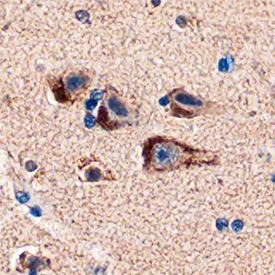Human/Mouse PEA-15 Antibody Summary
Ala2-Ala130
Accession # Q15121
Applications
Please Note: Optimal dilutions should be determined by each laboratory for each application. General Protocols are available in the Technical Information section on our website.
Scientific Data
 View Larger
View Larger
Detection of Human PEA‑15 by Western Blot. Western blot shows lysates of A172 human glioblastoma cell line and human cortex tissue. PVDF membrane was probed with 1 µg/mL of Sheep Anti-Human/Mouse PEA-15 Antigen Affinity-purified Polyclonal Antibody (Catalog # AF5588) followed by HRP-conjugated Anti-Sheep IgG Secondary Antibody (Catalog # HAF016). A specific band was detected for PEA-15 at approximately 15 kDa (as indicated). This experiment was conducted under reducing conditions and using Immunoblot Buffer Group 8.
 View Larger
View Larger
PEA‑15 in Human Brain. PEA-15 was detected in immersion fixed paraffin-embedded sections of human brain (cortex) using Sheep Anti-Human/Mouse PEA-15 Antigen Affinity-purified Polyclonal Antibody (Catalog # AF5588) at 1 µg/mL overnight at 4 °C. Tissue was stained using the Anti-Sheep HRP-DAB Cell & Tissue Staining Kit (brown; Catalog # CTS019) and counterstained with hematoxylin (blue). Specific staining was localized to neurons. View our protocol for Chromogenic IHC Staining of Paraffin-embedded Tissue Sections.
Reconstitution Calculator
Preparation and Storage
- 12 months from date of receipt, -20 to -70 °C as supplied.
- 1 month, 2 to 8 °C under sterile conditions after reconstitution.
- 6 months, -20 to -70 °C under sterile conditions after reconstitution.
Background: PEA-15
PEA-15 (Phosphoprotein Enriched in Astrocytes of 15 kDa) is a 15 kDa cytoplasmic protein that regulates cell proliferation and apoptosis. It is expressed in multiple cell types such as astrocytes; skeletal muscle and adipocytes. Human PEA-15 is 130 amino acids (aa) in length. It contains a death effector domain (aa 3‑81), plus two regulatory Ser phosphorylation sites. In a quiescent cell, it is either non-phosphorylated or constitutively phosphorylated at Ser116. Non-phosphorylated PEA-15 binds ERK, inhibiting cell proliferation. Phosphorylation at Ser116 promotes PEA-15 binding to FADD, blocking apoptosis. And activation-induced phosphorylation at Ser104 blocks PEA-15 binding to ERK, promoting cell proliferation. There is one potential alternate start site 21 aa upstream of the standard start site, and a second isoform that shows an Asn substitution for aa 36‑58. Full-length human and mouse PEA-15 show 99% aa identity.
Product Datasheets
FAQs
No product specific FAQs exist for this product, however you may
View all Antibody FAQsReviews for Human/Mouse PEA-15 Antibody
There are currently no reviews for this product. Be the first to review Human/Mouse PEA-15 Antibody and earn rewards!
Have you used Human/Mouse PEA-15 Antibody?
Submit a review and receive an Amazon gift card.
$25/€18/£15/$25CAN/¥75 Yuan/¥2500 Yen for a review with an image
$10/€7/£6/$10 CAD/¥70 Yuan/¥1110 Yen for a review without an image

